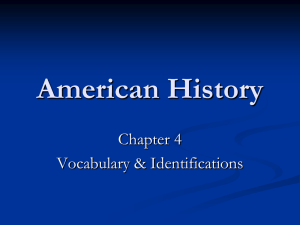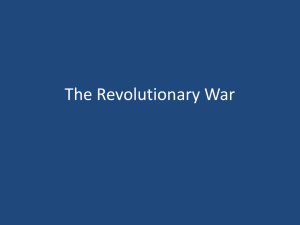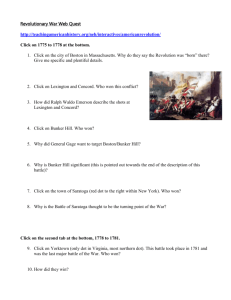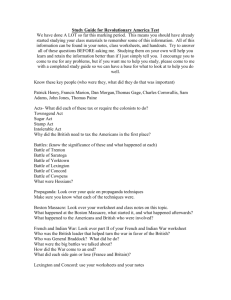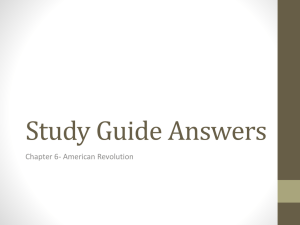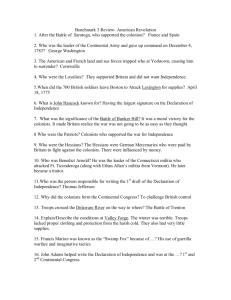IV. The Revolutionary War
advertisement
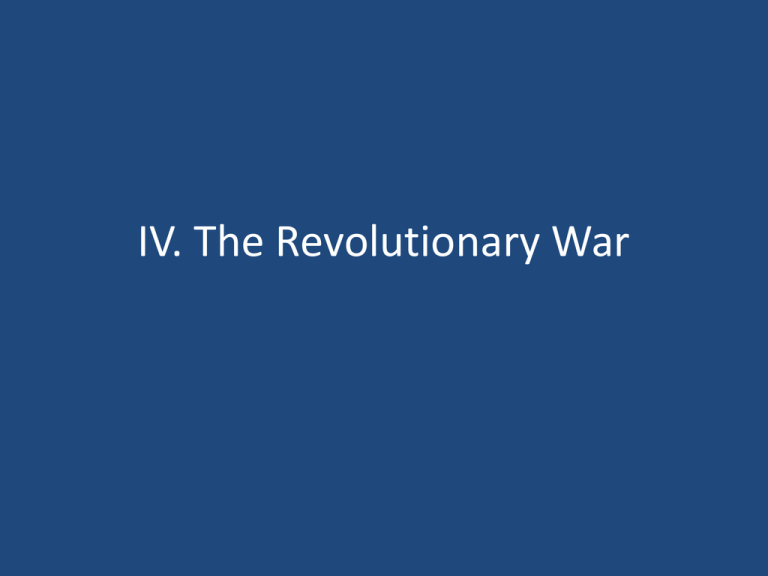
IV. The Revolutionary War A. Strengths and Weaknesses 1. Continental Army + Strong Military Leadership + Fighting on home territory + Alliance with France - Small, untrained military - Shortages of resources - Weak Central Government 2. British Army + Well-trained military + Lots of resources + Alliances with Loyalists - Fighting in unfamiliar territory - Fighting far from home Lexington & Concord 1. Where: Connecticut 2. When: April 1775 3. Summary of the battle (s)? • British troops told 70 colonists in Lexington to put down their weapons but the colonists refused. • The British killed 8 militiamen then marched on to Concord where they destroyed military supplies. • 4,000 minutemen/militiamen arrived in Concord and forced the British to retreat. Lexington and Concord 4. Outcome: • The British will win the battle in Lexington but the Colonists will win the battle in Concord • Ralph Emerson will make his famous quote about the colonists firing their muskets for the first time – “shot heard ‘round the world.” 5. Explain its importance? • American colonists will need to choose sides – fight with the loyalists or the patriots. • Back up their political beliefs using force against King George – fight him on their own soil! 6. If the outcome had been different in the Battle of Lexington, what prediction might you make? B. Beginning of War 1. Fighting in the North – Battles were focused in NY, NJ and PA – British take Long Island, NY – Christmas, 1776: Washington Crosses the Delaware and attacks the Hessians (German Mercenaries) Battle of Trenton 1. Where: New Jersey 2. When: December 1776: 3. Summary of the Battle? • Washington’s troops crossed an icy river to New Jersey. • The troops marched into Trenton, NJ to make a surprise attack on the Hessians (professional German soldiers who were ruthless and only fought for money – they did not have a loyalty to anyone). • The American troops killed over 900 Hessians and gained needed supplies. Battle of Trenton 4. Outcome: • This battle proved that General Washington was a better strategist than anyone had thought. • His men found confidence in the war and finally believed that they could defeat the British 5. Explain its importance: • More men were willing to volunteer for the war • American colonists wanted to show that they could become a nation without the support of the King 2. Winter of 1777-1778 – 1777: British Capture American Capital, Philadelphia – Continental army spends hard winter at Valley Forge Battle of Saratoga 1. Where: New York: 2. When: 1777 3. Summary of the Battle? • British troops are surrounded by the Continental Army. • The Continental Army will fire on the British day and night for days. Battle of Saratoga 4. Outcome: • The British soldiers are weakened by the constant bombing and attacks by the Continental Army. • The British finally surrender in complete defeat. 5. Explain its importance: • This was a major turning point for the Americans because it prevented the British from dividing the States • A division of the states would have isolated the Northern colonies from the southern colonies • It also showed Europeans that the Americans might win their war for independence from Great Britain. • NOW other nations are willing to help the Americans in their cause to separate from English rule under King George III – especially France. 6. Make a Prediction: What if the Americans had lost the Battle of Saratoga? 3. Battle of Saratoga – – – – – October 1777 5,000 British surrounded by 17,000 Americans British Surrender on October 17th Turning point in Revolutionary War Convinced the French to support the American cause C. American Victory 1. Fighting in the South – 1778: British shift strategy – Hoped to get the loyalists in the south to rise up and help them 2. Help from France – Sent gunpowder, artillery and muskets – Ben Franklin sent to France to get them to help more – Recognizes American Independence – Sent 6,000 troops to help the Americans Surrender at Yorktown and the Treaty of Paris 1. Where: Virginia 2. When: October 1781: 3. Summary of the Battle: • American and French forces surrounded British troops who were under General Cornwallis’s command. • Lafayette’s troops (American’s French ally) came by land from the west. • Washington and Rochambeau (French naval commander) came by land and ship from the north. • The French fleet blocked the Chesapeake Bay on the east coast. Surrender at Yorktown and the Treaty of Paris 4. Outcome: • This will be the last battle between the Americans and the British. • The Treaty of Paris will officially end the war. • Formal peace negotiations will end British control in America. 5. Explain its importance: • The U.S. will become independent. • Each side will pay back debts it owes to one another. • The British will lose all colonial holdings in America. 6. Evaluate the importance of a Peace Treaty that ends a war: 3. Victory at Yorktown – 17,000 American troops surround 7,000 British troops – Trap them in Yorktown – Battle of Yorktown lasts 3 weeks – British surrender on October 19,1781 4. Treaty of Paris (September 3, 1783) – – – – – Peace treaty to end the war British recognized American independence Mississippi River the western border of the US Spain regains Florida US agrees to pay British Merchants money they owe and Loyalists property losses
